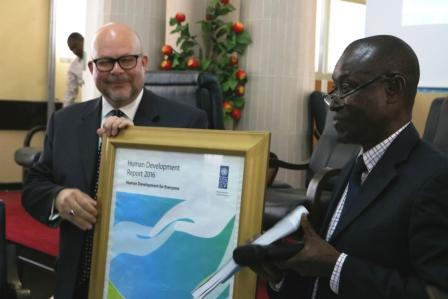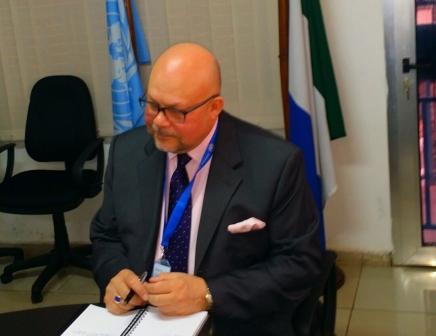Sierra Leone launches US$217.5m youth programme
to create one million new jobs, expand higher education
Freetown, April 15th 2014: The president of Sierra Leone Ernest Bai Koroma has launched an ambitious US$ 217.5m, three year National Youth Programme that seeks to create one million decent new jobs – the first ever and biggest national youth programme – reminding the nation that “the nation can only move forward when its youths step forward” at the Miatta Conference Hall in Freetown yesterday.
President Koroma also admonished the youths to prepare in order “to play in the premier league of development by training hard, acquire more skills and be disciplined so that you will benefit from the opportunities that are being provided.” Titled “A Blue Print for Youth Development – Sierra Leone’s National Youth Programme 2014-2018”, the national youth development plan also seeks to ensure that two million more Sierra Leonean youths are enabled with the means to effectively participate in national life as well as provide three hundred thousand more youths in secondary or higher education.
The National Youth Programme states that Sierra Leone has 1.7 million young people – 75 percent of its population is below the age of 35, and this number will only grow. 60 percent of young people are structurally unemployed – they are unable to provide sufficiently for themselves and their families. The secondary and tertiary education systems are also failing young people, with only 37% of the school-age youth population in education, and half of all young people illiterate.
The National Youth Programme, the development of which was supported by UNDP through the Ministry of Youth Affairs is complete with clear implementing strategies, a results framework and budget and management and coordinating mechanism.
A Programme of Action as part of the National Youth Programme identifies the challenges facing the youth development and developed a clear way forward to effectively drive the change in collaboration with young people themselves. The proposed national programme of action seeks to meet these challenges.
Under the leadership of the Ministry of Youth Affairs and the National Youth Commission, the Programme will focus on three objectives: 1/ Pro‐Youth Private Sector Development, 2/ Resilient and Effective Youth-Serving Institutions, and 3/ Youth-friendly Public Services. Furthermore over 5 years, the programme will coordinate, mobilise, mainstream, and extend youth-focused action to achieve the three goals – 1 million new youth jobs, 2 million active young citizens and 300,000 more youth in secondary or higher education.
The youth development plan was launched along with a theme song titled: ”De Blue Print for Youth Development” performed with energy and creativity by a youthful and talented Artistes for Development.
Acting UN Resident Coordinator, Gon Myers expressed the continued commitment of the United Nation to support the efforts of the country in confronting the youth question saying “It is desire to make sure youths positively contribute to advancing this nation and I wish say here that the youth agenda is a top priority for the UN.”
UDP Country Director Sudipto Mukerjee said Sierra Leone is making recognizable strides in democracy, peace consolidation and GDP growth, but more focused efforts are required for the general citizenry to feel the inclusiveness of this growth.
Mukerjee added that with a very young population, investments made in their social, economic and political empowerment and inclusion “they can easily become the drivers of a prosperous future” but if not, “they may rise to popular protest and risk the peace gains made so far, as we have seen in the Arab Spring.”
A representative of the youths, Alphonso Manley decried the high level of administrative costs related to youth projects (including salaries, costs of consultancies and vehicles) and called on donors and implementing agencies to focus on programmes with high benefits to young people and ensure the involvement of young people in design and implementation of projects.
Programme Manager for UNDP’s Youth Employment and Empowerment Programme Molla Alemu said after the launch ceremony “Partnership is the key if Sierra Leone is to achve what has been set out in this plan..this is only a good beginning, but it is now an imperative for international partners to help provide the resources for the young people of Sierra Leone.”
Background to Youth situation in Sierra Leone:
60% of Young People are Underemployed.
There are approximately 1.7 million young people between 15 and 35 years of age in Sierra Leone: 34 percent of the estimated population. Furthermore, 42% of Sierra Leonean’s are under the age of 15, and therefore the youth population will continue to increase.
During recent years, the Government has placed significant focus on improving the environment for investment and private sector development with a view to the creation of jobs. Youth have been given a central consideration as a driver of, and beneficiary from, economic prosperity – including the recent establishment of the Ministry of Youth Affairs (2013) and National Youth Commission (2011). UNDP has provided substantial support to develop the capacity of both institutions.
Youth unemployment remains a major social problem, however, with a structural unemployment rate of 60 percent – amongst the highest in the West African sub-region. Less that 34 percent of Sierra Leone’s young people (15‐24) are in the labour force. The literacy rate for youth (15-24) is only 57.6 percent (67.6% males, 48.1% females). Of the 21 percent of young people who enrol in junior secondary school, the proxy completion rates are 69.4 percent (males) and 74.3 percent (females).
According to McLaughlin et al (2013), single young men with some secondary education are the most likely to be employed or self‐employed; young married women with no education are the least likely. All young people face challenges in access to capital, supply chains, and comprehensive skills. Pressures to contribute to household livelihoods prevent many young people from completing their education.
There is a strong belief among young people that their needs are not met by the national and local political structure. Although they are cognizant of the important role local council play in delivering services to the community, they feel that the enabling environment is not present for them to participate actively in the national or local decision making process. They are of the view that they are systemically ‘shut out’ of the decision making process and that the services delivered do not meet their expectations.
UNDP
Stay with Sierra Express Medial, for your trusted place in news!
© 2014, https:. All rights reserved.





